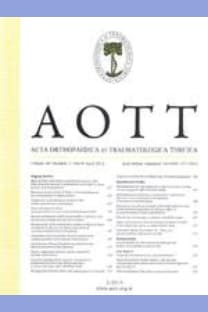Ortopedik cerrahi girişimlerin ertelenme nedenleri ve ertelemenin hastaların anksiyete ve ağrı düzeylerine etkisi
Hekim-hasta ilişkileri, Ameliyathane, Ağrı, Kaygı, Ortopedi, Anketler, Cerrahi işlemler, elektif
The reasons for postponement of scheduled orthopedic surgical operations and its effect on the patients' anxiety and pain levels
Physician-Patient Relations, Operating Rooms, Pain, Anxiety, Orthopedics, Questionnaires, Surgical Procedures, Elective,
___
- 1.Onat D. Cerrahinin tarihçesi. In: Sayek İ, editör. Temel cerrahi. 2. baskı. 1. cilt, Ankara: Güneş Kitabevi; 1993. s. 3-28.
- 2. Hodge D. Day surgery: a nursing approach. Edinburg: Churchill Livingstone; 1999.
- 3. Doğan N, Yavuz M, Alagöz E, Hepgünay H, Tuncer H, Çam S. Ameliyathanede vaka iptallerinin incelenmesi. Hemşirelik Forumu 2002;5(3):35-9.
- 4. Lacqua MJ, Evans JT. Cancelled elective surgery: an evaluation. Am Surg 1994;60:809-11.
- 5. Pollard JB, Olson L. Early outpatient preoperative anesthesia assessment: does it help to reduce operating room cancellations? Anesth Analg 1999;89:502-5.
- 6. Savaşır I,Şahin NH. Bilişsel-davranışcı terapilerde değerlendirme: Sık kullanılan ölçekler. Ankara: Özyurt Matbaacılık; 1997.
- 7. Eti Aslan F. Postoperatif ağrı değerlendirmesinde görsel kıyaslama ve basit tanımlayıcı ölçeklerin duyarlılık ve seçiciliklerinin karşılaştıtılması. In: VI. Ulusal Hemşirelik Kongresi Kitabı; 14-16 Mayıs 1998, Ankara, Türkiye. Ankara: 1998. s. 178-86.
- 8. Turk DC, Melzack R, editors. The McGill Pain Questionnaire. In: Handbook of pain assessment. New York: Guilford Press; 1992. p. 152-68.
- 9. Odom J. Postoperative pain care and complications. In: Meeker MH, Rothrock JC, editors. Alexander’s care of the patient in surgery. 11th ed. St. Louis: Mosby; 1999. p. 239-59.
- 10. Tulunay M, Tulunay FC. Ağrı değerlendirmesi ve ağrı ölçümleri. In: Erdine S, editör. Ağrı. 1. baskı. İstanbul: Alemdar Ofset; 2000. s. 91-107.
- 11. Knight C. Why elective surgery is cancelled. AORN J 1987;46:935-9.
- 12. Dix P, Howell S. Survey of cancellation rate of hypertensive patients undergoing anaesthesia and elective surgery. Br J Anaesth 2001;86:789-93.
- 13.Wildner M, Bulstrode C, Spivey J, Carr A, Nugent I. Avoidable causes of cancellation in elective orthopaedic surgery. Health Trends 1991;23:115-6.
- 14. Jorgensen LN, Hinrichsen NC, Kristensen NK, Kramhoft J. Cancelled surgical interventions at an orthopedic department. Ugeskr Laeger 1991;153:1657-8. [Abstract]
- 15. Burden N. Ambulatory surgical nursing. Philadelphia: W. B. Saunders; 1993.
- 16. McWhinnie DL, Michaels JA, Collin J, Morris PJ. Resource implications of cancelled operations. BMJ 1994;308:138-9.
- 17. van Klei WA, Moons KG, Rutten CL, Schuurhuis A, Knape JT, Kalkman CJ, et al. The effect of outpatient preoperative evaluation of hospital inpatients on cancellation of surgery and length of hospital stay. Anesth Analg 2002;94:644-9.
- 18. Aaserud M, Trommald M, Boynton J. Elective surgery-cancellations, ring fencing and efficiency. Tidsskr Nor Laegeforen 2001;121:2516-9. [Abstract]
- 19. Koppada B, Pena M, Joshi A. Cancellation in elective orthopaedic surgery. Health Trends 1991;23:114-5.
- 20. Morrissey S, Alun-Jones T, Leighton S. Why are operations cancelled? BMJ 1989;299:778.
- 21. Bayraktar N, Bulut HD. Ameliyathanede ameliyat öncesi bekleyen hastaların gereksinimleri. Hemşirelik Forumu 2000;6:34-8.
- 22. Bölükbaşl N. Ameliyat olacak hastaların hemşirelerden beklentileri. Ege Üniversitesi Hemşirelik Yüksekokulu Dergisi 1992;2:21-9.
- 23. Bekaroğlu M, Uluutku N, Alp K, Lüleci N. Ameliyat öncesi kaygı ve depresyon durumunun ameliyat komplikasyonları na ve yatış süresine etkisi üzerine bir çalışma. Türk Psikiyatri Dergisi 1991;4:285-8.
- 24.Aydemir Ö, Köroğlu E. Durumluluk-süreklilik kaygı envanteri. In: Aydemir Ö, Köroğlu E, editörler. Psikiyatride kullanılan klinik ölçekler. Ankara: Medico Graphics Ajans ve Matbaacılık; 2000. s. 121-60.
- 25. Yücel B. Ağrılı hastanın psikiyatrik de¤erlendirmesi. In: Erdine S, editör. Ağrı. 1. baskı, İstanbul: Alemdar Ofset; 2000.s. 62-7.
- 26. Kocaman G. Postoperatif ağrı. In: Ağrı, hemşirelik yakla- şımları. 1. baskı, İzmir: Saray Medikal Yayıncılık; 1994. s. 175-96.
- 27. Erdine S. Ağrının tedavisi. In: Kalaycı G, editör. Genel cerrahi. 1. cilt, İstanbul: Nobel Tıp Kitabevleri; 2002. s. 173-85.
- ISSN: 1017-995X
- Başlangıç: 2015
- Yayıncı: Türk Ortopedi ve Travmatoloji Derneği
Dadaş Sevgi ELDAŞ, Eti Fatma ASLAN
Dizde yaygın sinovyal hemanjiyom: Olgu sunumu
ERHAN YILMAZ, Lokman KARAKURT, Hüseyin ÖZDEMİR, Erhan SERİN, Mustafa İNCESU
Ergenlik dönemindeki çocuklarda statik ve dinamik ayak basınç değerleri
HAKAN TUNA, Mustafa YILDIZ, COŞKUN ÇELTİK, Siranuş KOKİNO
Çocuklardaki femur cisim kırıklarında titanyum elastik çivilerle intramedüller tespit sonuçları
Memduh HEYBELİ, HASAN HİLMİ MURATLI, Levent ÇELEBİ, Serap GÜLÇEK, ALİ BİÇİMOĞLU
El yerleşimli osteoid osteomlu sekiz olgunun değerlendirilmesi
S. Sinan BİLGİN, HÜSEYİN YUSUF YILDIZ, BERK GÜÇLÜ, Yener SAĞLIK
Doğumsal brakiyal pleksus yaralanmalarında sinir cerrahisinin erken sonuçları
Atakan AYDIN, Berkan MERSA, Metin ERER, Türker ÖZKAN, Safiye ÖZKAN
Doğumsal brakiyal pleksus felcinde omuz abdüksiyon ve eksternal rotasyonunun rekonstrüksiyonu
Türker ÖZKAN, Atakan AYDIN, Defne ÖNEL, Safiye ÖZKAN
Makrodistrofi lipomatoza: Olgu sunumu
Adil ÖZTÜRK, Lütfü BAKTIROĞLU, Ebru ÖZTÜRK, Pelin YAZGAN
Gebelikte geçici kalça osteoporozu: Üç Olgu sunumu
Murat BEZER, Kemal GÖKKUŞ, Barış KOCAOĞLU, Bülent EROL, Osman GÜVEN
